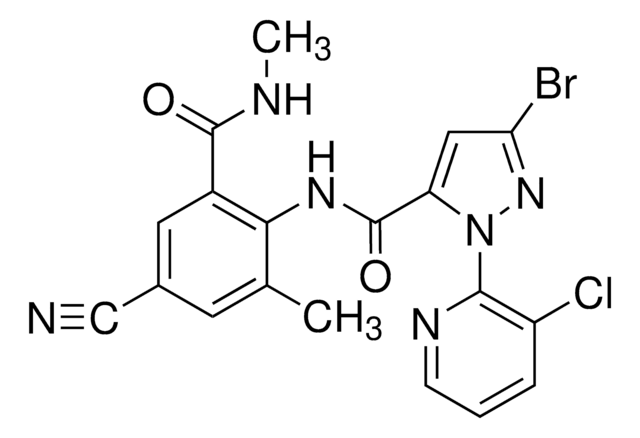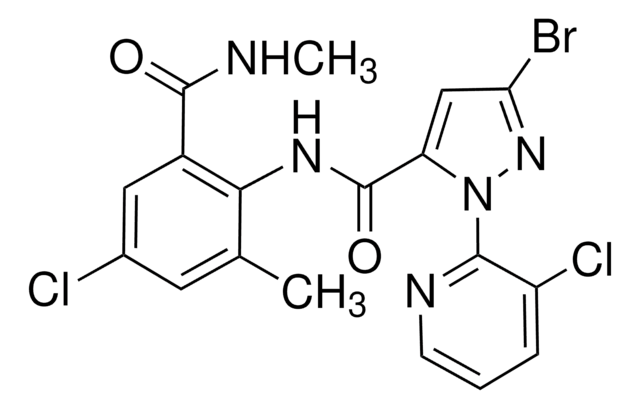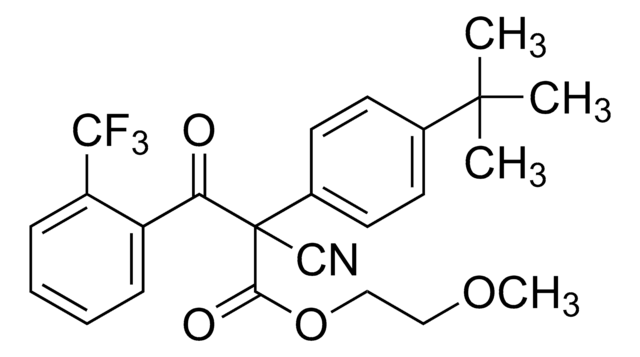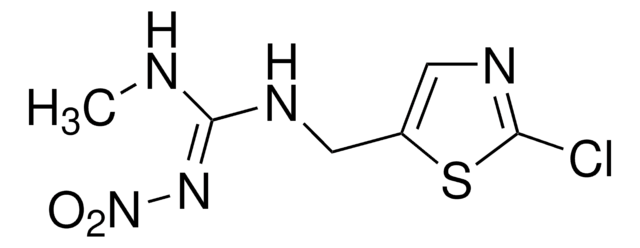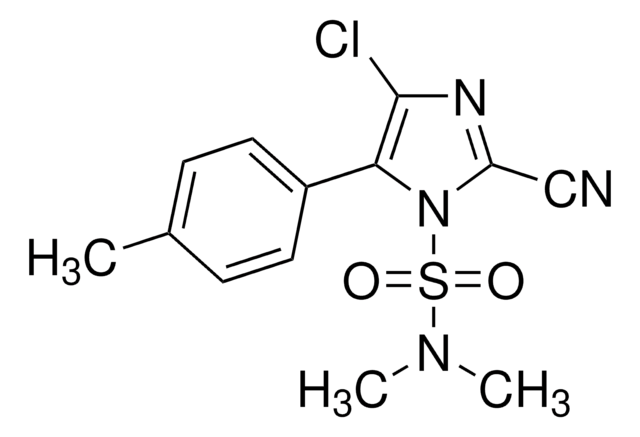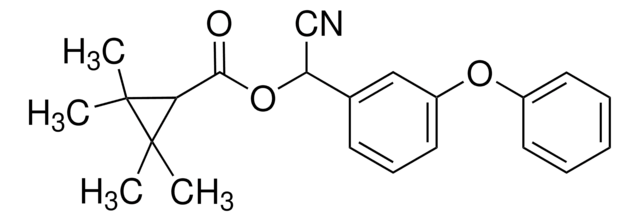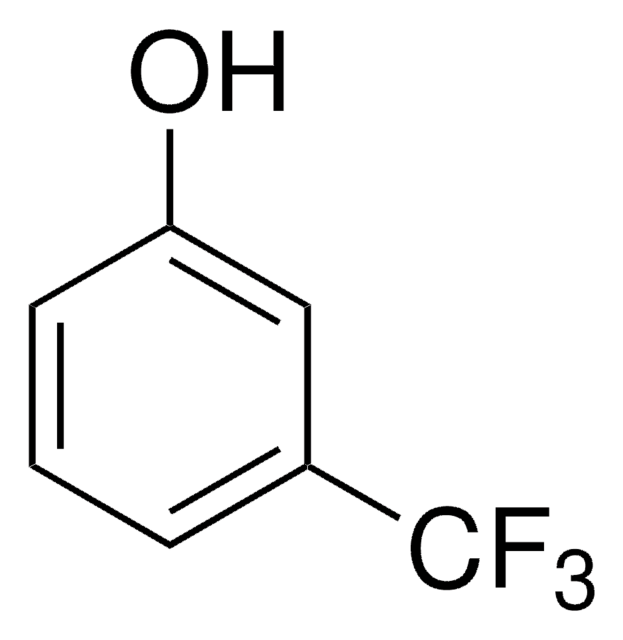CRM01303
Cyantraniliprole
certified reference material, TraceCERT®, Manufactured by: Sigma-Aldrich Production GmbH, Switzerland
Sinonimo/i:
3-Bromo-1-(3-chloro-2-pyridyl)-4′-cyano-2′-methyl-6′-(methylcarbamoyl)pyrazole-5-carboxanilide
About This Item
Prodotti consigliati
Grado
certified reference material
TraceCERT®
Livello qualitativo
Nome Commerciale
TraceCERT®
Durata
limited shelf life, expiry date on the label
Produttore/marchio commerciale
Manufactured by: Sigma-Aldrich Production GmbH, Switzerland
Temperatura di conservazione
−20°C
Stringa SMILE
O=C(C1=CC(Br)=NN1C2=C(Cl)C=CC=N2)NC3=C(C(NC)=O)C=C(C#N)C=C3C
InChI
1S/C19H14BrClN6O2/c1-10-6-11(9-22)7-12(18(28)23-2)16(10)25-19(29)14-8-15(20)26-27(14)17-13(21)4-3-5-24-17/h3-8H,1-2H3,(H,23,28)(H,25,29)
DVBUIBGJRQBEDP-UHFFFAOYSA-N
Cerchi prodotti simili? Visita Guida al confronto tra prodotti
Categorie correlate
Descrizione generale
Certified content by quantitative NMR incl. uncertainty and expiry date are given on the certificate.
Download your certificate at: http://www.sigma-aldrich.com
Cyantraniliprole, a second-generation diamide insecticide, activates the ryanodine receptors of insects to cause the release of Ca2+ ions resulting in muscle paralysis and death of the insect. It shows ovicidal, larvicidal, and adulticide activity, depending upon the pest species. It is used for cereal crops and vegetables, such as rice, peanuts, corn, tomatoes, green onions, and cucumbers for protection against lepidopteran and coleopteran pests.
Cyantraniliprole is approved for use in the European Union. The maximum residue limits (MRL) for cyantraniliprole in food crops, as per EU regulations are in the range of 0.01-15 mg/kg. As per a request received for cyantraniliprole MRL modification by an evaluating member state (EMS) on 28th January 2015, the EFSA has proposed an MRL of 0.5 mg/kg in strawberries, 0.2 mg/kg in the crop groups “herbal infusions from roots” and “root and rhizome spices”, 0.04 mg/kg on beans without pods, 0.15 mg/kg on peas without pods, and 0.1 mg/kg in globe artichokes. No MRL modifications were made for cherries, carrots, root and tuber vegetables, and brussels sprouts. Cyanantraniliprole is monitored in the Multiannual Control Programmes for Pesticides Residues (MACP), run within the EU and EFTA in/on products of plant origin.
Applicazioni
Cyantraniliprole certified reference material (CRM) may also find following use:
- Study of DNA damage, oxidative stress, and biological toxicity caused in earthworm by cyantraniliprole
- Development of an isotope-labelled internal standard based method using ultra-high-performance liquid chromatography-tandem mass spectrometry for the analysis of chlorantraniliprole and cyantraniliprole in fruits, vegetables, and cereals
- Simultaneous determination of 8 new generation amide insecticides by ultrahigh performance liquid chromatography-tandem mass spectrometry in complex food matrices
- Estimation of five diamide insecticides using carbon nanotube multiplug filter for sample clean-up and ultrahigh-performance liquid chromatography-tandem mass spectrometry in food matrices
- Simultaneous analysis of five diamide insecticides in edible mushrooms by high-performance liquid chromatography coupled to tandem mass spectrometry (HPLC-MS/MS) and a modified QuEChERS procedure for extraction
Prodotti consigliati
Note legali
Avvertenze
Warning
Indicazioni di pericolo
Consigli di prudenza
Classi di pericolo
Aquatic Acute 1 - Aquatic Chronic 1
Codice della classe di stoccaggio
11 - Combustible Solids
Classe di pericolosità dell'acqua (WGK)
WGK 3
Punto d’infiammabilità (°F)
Not applicable
Punto d’infiammabilità (°C)
Not applicable
Scegli una delle versioni più recenti:
Certificati d'analisi (COA)
It looks like we've run into a problem, but you can still download Certificates of Analysis from our Documenti section.
Se ti serve aiuto, non esitare a contattarci Servizio Clienti
Possiedi già questo prodotto?
I documenti relativi ai prodotti acquistati recentemente sono disponibili nell’Archivio dei documenti.
Il team dei nostri ricercatori vanta grande esperienza in tutte le aree della ricerca quali Life Science, scienza dei materiali, sintesi chimica, cromatografia, discipline analitiche, ecc..
Contatta l'Assistenza Tecnica.